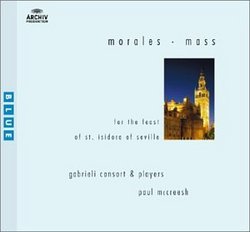| All Artists: Francisco Guerrero, Philippe Rogier, Antonio de Cabezon, Plainchant Chant, Cristobal de Morales, Nicolas Gombert, Gregorian Chant, Thomas de Santa Maria, Paul McCreesh, Gabrieli Consort & Players, Timothy Roberts Title: Morales: Mass for the Feast of St. Isidore of Seville Members Wishing: 0 Total Copies: 0 Label: Deutsche Grammophon Release Date: 4/8/2003 Album Type: Original recording remastered Genres: Special Interest, Pop, Classical Styles: Vocal Pop, Opera & Classical Vocal, Chamber Music, Historical Periods, Classical (c.1770-1830), Early Music, Instruments, Keyboard Number of Discs: 1 SwapaCD Credits: 1 UPC: 028947422822 |
Search - Francisco Guerrero, Philippe Rogier, Antonio de Cabezon :: Morales: Mass for the Feast of St. Isidore of Seville
 | Francisco Guerrero, Philippe Rogier, Antonio de Cabezon Morales: Mass for the Feast of St. Isidore of Seville Genres: Special Interest, Pop, Classical |
Larger Image |
CD Details |
CD ReviewsRenaissance polyphony at its most accessible Sator | Sydney, Australia | 08/04/2005 (5 out of 5 stars) "The American musicologist Robert Stevenson once wrote that: "No Spanish composer of the sixteenth century was more lauded during his lifetime and for two hundred years after his death than Morales." Spanish contemporaries such as the music theorist Juan Bermudo (c.1510-c. 1565), and the composer Juan Vasquez (c.1510-c. 1560) proclaimed Christobal Morales (c.1500 - 1553) "la luz de España en la música" ("the light of Spain in music"). Morales wrote in the post-Josquin polyphonic style of composition introduced to Spain in its golden age by Penalosa. Morales was particularly heavily influenced by Josquin, and even his masses based upon plainsong make frequent references to him. As he was active in Rome for so much of his life, Morales was always regarded as a foreigner on his return to Spain, so that nationalistic Spanish musicologists have always tended to try to find tendencies in his music that supposedly epitomize his 'Spanish mysticism' rather than accepting his status as a major European artist of international standing as he deserves. Morales was popular as a composer for a good two centuries after his death so that throughout the sixteenth and seventeenth century much of his music was played in recreational and domestic contexts in Spain in arragements from Morales's masses for vihuela, harp, or keyboard. Even today his attractiveness as a composer remains evident, so that if there were a single recording of a complete Renaissance polyphonic mass cycle to recommend to newcomers I would immediately choose this recording. The Mass Mille Regretz is a parody mass based on the chanson Mille Regretz by Josquin and the beautiful chanson theme is quite obvious in every section of the mass cycle. Surely this must be one of the most beautiful melodies ever written in musical history, and the degree of literal repetition of the theme might have outstayed its welcome had it not been so lovely. By the same token, this very feature of the writing makes it extremely wide-ranging in its appeal and many who find Renaissance polyphony daunting to listen to should try this recording. As usual, Paul McCreesh performs things in liturgical context intermixed with a collection of often fascinating instrumental music. The playing and singing is wonderful throughout and the recording allows the resonance of a church acoustic to come through without excessively compromising detail. In the guise of this new issue at a lower price this recording is a real steal that belongs in every good music collection." The sum better than the parts Leonardo | Argentina | 10/01/2005 (5 out of 5 stars) "Why you should buy this CD?
Well, morales is one of the great masters of renaissance. But so others, like Victoria, Palestrina ... Difference is in the players? Sure one of the best. But also others are great (Herreweghe). No, the reason why this is one of the best renaissance cds is the program and the conductor. A carefully calculated mixture of moods and textures. A great ceremony having been reconstructed. Yes, the choir seems full rounded, with great falsettists but with a bit heavy vibrato in other voices. However, instruments are splendid. The reason as I said is the program. here you have polyphony, gregorian chant, lithurgical chant, music for wind band and organ music, presented with such variety and coherence that makes you believe than the whole is greater than the parts. Archiv was right in highliting this CD for its "Archiv blue" selection. As essential as Callas was to opera is Mccreesh to Ancient music. If you are not convinced, try this CD. You will never think the same." |
